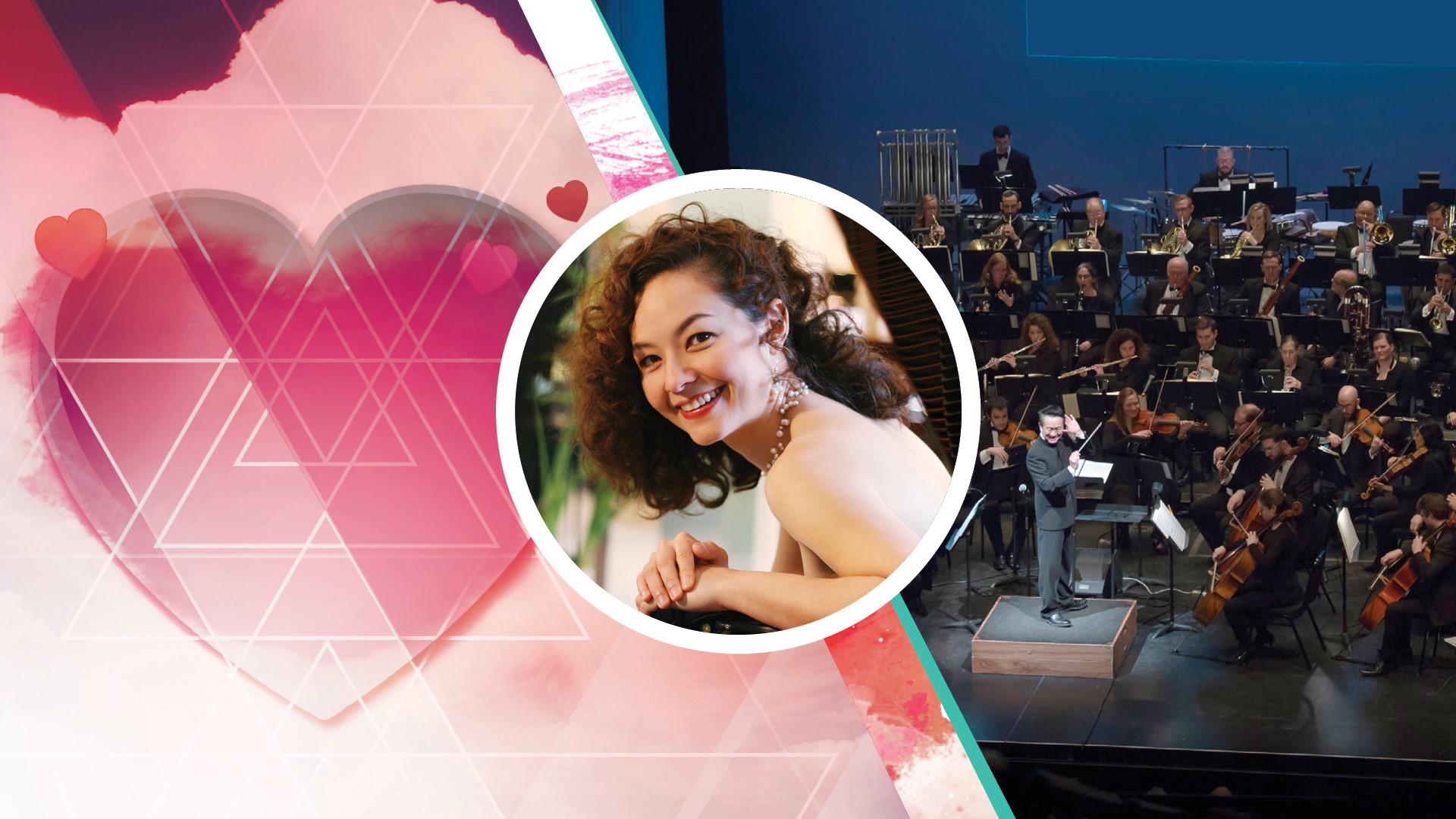BLOOMINGTON, Ill. — Love was in the air at the Bloomington Center for the Performing Arts Friday, which had big pink hearts projected onto the Illinois Symphony’s white bandshell set onstage. Indeed, many couples braved frigid temperatures and icy roads for this Valentine’s Day engagement called Love Notes, with the ISO offering a smattering of compositions from the Romantic period.
ISO music director Ken Lam opened the program with a lec-dem of sorts, introducing the audience to the various themes of Don Juan. Basically an 1888 version of the Britney Spears song Womanizer, this tone poem for full orchestra is Richard Strauss’ symphonic interpretation of the literary Casanova who is dragged to hell, where he must account for his unsavory choices. In Lam’s telling, amorous solos for violin (Roy Meyer) and oboe (Erik Andrusyak) tell of his many conquests, sandwiched between a repeating theme clueing us to Don Juan’s reputation as a wannabe swashbuckler.
But, of course, Strauss was all about the horns, and the ISO’s back row did not disappoint in this, a most iconic passage for that glorious instrument (a disclosure: having studied it in my youth, I’m as partial to the horn as Strauss was…)
Conversely, Piotr Ilytch Tchaikovsky doesn’t show as clear a bias, particularly in the selections Lam chose from the composer’s first ballet, Swan Lake. Slightly more romantic than Don Juan, but no less tragic, Swan Lake tells the story of a young nobleman who falls in love with a swan maiden who, with her fellow swan maidens, haunt an idyllic lake at night. It gets a little more complicated than that, and depending on the version of the ballet you’re watching, Prince Siegfried—he’s the noble—and Odette, the swan, live happily ever after, or commit suicide, or die separately in order to break the spell that’s made Odette a swan in the first place.
In this context, however, that doesn’t matter so much. In pulling together a compilation of some of the ballet’s best bits, Lam reminds us what a fantastic score this is, even without the dancing. This is one of ballet’s greatest scores, created at a time when “respectable” composers like Tchaikovsky wouldn’t dare write music for dancing. In my view, this music is largely responsible for why the ballet remains popular today.
Presented as a suite in multiple movements, this Swan Lake felt choppy and disjointed, but Lam’s selections made sure to show how Tchaikovsky gives so many members of the orchestra—who would usually be performing this work in a pit without much recognition for the extraordinary talent it takes to play it well—a chance to show off. Specifically, the ballet leans heavily on harp (Eleanor Kirk), oboe (Andrusyak) and the strings. There are moments for the woodwinds in the dances of the swans, for the brass and percussion in the cultural dance divertissements, and for a single violin (Meyer) and cello (Nomin Zolzaya) in the white swan pas de deux.
Once on faculty at Southern Illinois University, pianist Sandra Wright Shen previously appeared as a guest artist with the ISO last April for Mozart’s Piano Concerto No. 23. For the second half of this love-themed concert, Shen tackled what might be considered the opposite of Mozart: Sergei Rachmaninoff’s Piano Concerto No. 3.
Although, the beginning of Rachmaninoff’s 3rd piano concerto might sound a tiny bit like Mozart after all. Crisp, clean and precise at the start, the first of three movements morphs into a more Rachmaninoffian conglomeration of intensely difficult arpeggios and scales. The notes are layered on so thick it can be difficult to see the forest through the trees; indeed, the orchestra seemed to be just hanging on at some points, which is honestly all you can expect from this piece.
I mean that in a good way. This is an extraordinary work. And Shen is an extraordinary pianist, literally bouncing up and down her bench as she traversed the keyboard to its very ends over and over. This could easily be counted among Shen’s signature pieces—it was her first CD, recorded live. And her presence while playing the concerto is calm and collected. Every other attempt seen by this critic leaves the soloist distraught and sweating.
That she could finish such a feat and return to the stage, unphased, for a sweet little encore gives some indication that Shen has more to give, even than this. The question is, will Lam bring her again, so we can experience it?
